Akron mayoral candidates discuss police reform, school safety during debate
All seven candidates for Akron mayor discussed their plans and visions for the city in a 90-minute debate Wednesday.
The candidates are:
Mark Greer, former Akron small business program manager
Shammas Malik, Akron Ward 8 councilman
Keith Mills, school intervention specialist
Tara Mosley, Akron Ward 5 councilwoman
Joshua Schaffer, cellphone store manager
Marco Sommerville, deputy mayor
Jeff Wilhite, Summit County councilman
The candidates answered questions about their past job experiences that have made the city a better place; the Jayland Walker police shooting, police reform and public safety; past mistakes they've made; affordable housing issues; government transparency; and public education and school safety.
Each candidate also answered an individual question based on their past experiences.
A few of the questions and the candidates' responses are included below:
Jayland Walker police shooting
Question: What would you have done in the wake of the Jayland Walker police shooting, including what is your message for Akron today?
Sommerville: “Well, first of all, I just want to just say that the auditor form of oversight did work, and it worked to the standpoint that when the Department of Justice came to the city of Akron and looked at our record, generally, if you look at Columbus, you look at Cincinnati, those communities were taken over after the DOJ came in and looked at what they were doing, and that did not happen in Akron, and that's a lot to do with the fact that we did have some type of oversight that I started 20 years ago. That was long before George Floyd happened, long before any other situations that we see across the country happened, and I was one of the first to do that, to make sure that we had something in place that would work until we could take the next step. Now, we've taken the next step with Issue 10. So I think we need to work with Issue 10, make sure that it works. My only concern with Issue 10 is that a number of neighborhoods don't have representation, and every neighborhood should be represented on that board to make these decisions, and the way it was set up, it was not set up that way. And I think it causes us problems down the road, because there are gonna be certain parts of the community who feel that they're not part of the solution, and they should be part of the solution.”
Mills: “I might need more than a minute and a half for this one. It runs deep, but immediately after that incident happened with Jayland, I would have profusely apologized to his mother, I would have made sure that they were safe and made sure that they had everything they needed right immediately. I know legally, from being a city, you have to tiptoe around legal issues, but the police officers, if I could have, they would have not been back on the force until the investigation was done. I don't care if they had staffing issues or not; you’re gonna figure it out. I figure it out every day when we're in teaching because we have a shortage there. All of you out there you have shortages at your businesses too. There's no reason. That's disrespectful to his family. We would have done a very thorough investigation. It would have been impartial. You can't have the police policing themselves, and that's a conflict right there. But I can go on and on. But my main reaction would have been reaching out to his family to make sure that they were secure and safe and make sure that they, I would have taken steps to make sure that Jayland was taken care of too afterwards, meaning that we would have picked up the tab for his funeral. We would have made sure that he was OK, that they felt that they were respected and that they were a part of the community, even though this tragedy happened. And just inside right now, I just, I feel shaken up just even talking about it that why we keep having these issues happen over and over again.”
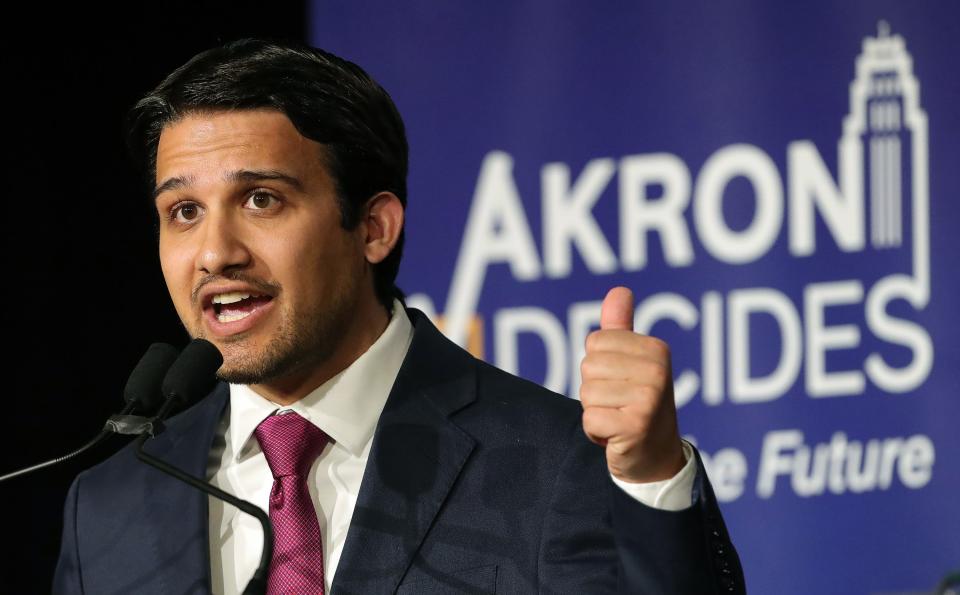
Malik: “In the days after the tragic killing of Jayland Walker, the whole city felt like it was in crisis. And I think there was a missed opportunity to communicate a lot better. The information first started leaking out in the press and it was almost a week before we actually saw this video and there was I think an opportunity to get more information out and to instead of having kind of a closed posture, have more of an open posture, acknowledging that this killing represents a systemic failure in terms of policy, in terms of practice. Regardless of what the grand jury holds, we all know that no one should fire on someone that many times when they're on the ground, and our leaders, all of our leaders should have been saying that on day one. Beyond that, I think that the most important thing is that trust needs to be built before a tragedy, not after, because in the days after, we were all going back and forth of whether there should be this charter amendment or this ordinance. People weren't able to sit around a room together, around a table together. The mayor has to be able to convene people together, but only if there's trust built up. We should have been acting on many of these reforms years earlier. But unfortunately, we need someone in the mayor's office who treats this issue with a great deal more urgency.”
Jayland Walker grand jury decision: Is Akron ready? With Jayland Walker grand jury decision coming, city prepares
Schaffer: “Jayland was murdered. And I would have named the officers, I would have terminated the officers, period. Alright, let's talk a little bit about police reform, though. My colleague Shammas believes that the police should police themselves. He says that police should have a voice on this police review commission. Shammas, the police should not police themselves. There should be no police on the police reform commission. Further, he said that they should have no termination powers. He said we're not ready for them to have termination powers. We need to negotiate with the police to have termination powers. And finally, Issue 10 requires a supermajority of City Council. Those people should be elected by the people of the city of Akron. And finally, my message to the community: If you want to get out there and protest, I will be there with you. I will be there on the streets protesting with you, but it has to be peaceful. It has to be peaceful. It has to be nonviolent. There can't be any smashing of windows, no criminal activity. Look, last time, the windows got smashed out at Portage Path Behavioral Health. They have nothing to do with Jayland Walker. They're helping serve our community. Let's make our community better. We're doing this because we love Akron, so let's not destroy Akron in the process of grieving.”
Jayland Walker state investigation: Jayland Walker: What the state investigation of fatal Akron police shooting may reveal
Greer: “So, in the first aftermath of the killing of Jayland Walker, we at the city should have joined the family not only in the calls for peace, but in the calls for justice, because justice is not a bad word. We have to make sure that we are addressing the community that has been disproportionately impacted, and that is our young Black men. And that means treating our Black men with respect and dignity and honor. When I watched with all of you that initial press conference, we were all told to wait for the investigation to conclude. We're now coming near that point. But at that press conference, I watched as our city leaders and law enforcement castigated a dead unarmed Black man named Jayland Walker, stating as fact that he had shot a gun out of his car when the investigation was not even complete. What message are we sending? When we look at what happened with the citizens oversight review board and the unfair treatment of Imokhai Okolo. Here is a young Black man who was maligned and victimized, and we had to wait to fill that final seat where we should have more than one young Black man because that is the community that has been most affected. We have to treat our people better.”
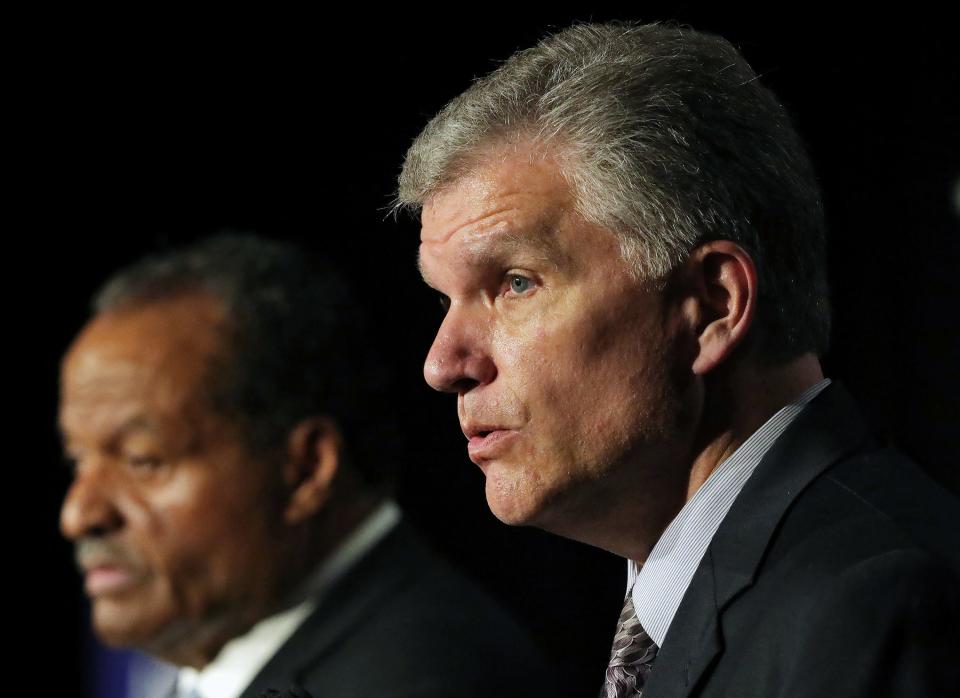
Wilhite: “I think the most important thing that I would have done was I would have been much more transparent in the aftermath of that shooting. And I agree with Mr. Greer, we needed to put our arms around the Walker family. And Mrs. Walker showed unbelievable grace at a tragic time in her life, where she asked for peace and calm in the community, and I think we need to respect her wishes as a community. It made me think of Dr. King, when he said or he asked the question chaos over community. Community has to win every day, ladies and gentlemen. That's who we are collectively. We have to work together to make this right and not to have this tragedy be a tragedy in vain. I believe very strongly that the citizens did an incredible thing. They came forward, they created the hope that came out of this tragedy by creating the police review committee or commission because now we have a potential answer. We all have to get behind them. We all have to make sure they have the resources, both human and financial, to make sure that that program works well. As your next mayor, I will make sure that that police review committee has all the tools they need so that this doesn't happen again, and we can work every day to try and prevent this kind of a tragedy from happening again.”
Jayland Walker grand jury: 'Solemn duty:' Ahead of Jayland Walker case, what we know about the grand jury process
Mosley: “Jayland Walker's life mattered. And 62% of Akronites echo that his life mattered. I have said from the beginning that I felt that the officers should be fired. If they were found to have not done anything wrong, the job of the union is to get their jobs back. I think it sent the wrong message when not only did they get to come back to work, while they were on vacation, they were paid in full. So those are things that have to be worked out during collective bargaining, where we have conversations about whenever there's an officer-involved shooting and the officer is relieved of his duties but still paid, I think we need to work on that because they’re still employed, they should not be paid while they're sitting at home on vacation after the death of an individual, and that is where collective bargaining comes in. And you need a strong mayor who will be able to sit with the FOP and have those hard conversations because this is where change begins. It comes by sitting at the table with one another and agreeing to disagree but working things out so when and if we ever have another Jayland Walker, it is stated clearly that the officers are suspended without pay.”
(Malik was permitted a 30-second rebuttal because Schaffer mentioned him by name in his remarks) Malik: “Just briefly, the things that Mr. Schaffer mentions, a board that would levy discipline directly, those things aren't permitted by state law or by our current contract. Now, we very clearly crafted Issue 10 to make sure that it was consistent with our city charter, with state law and the contract. And one of the particular things is that, just going back a year ago, there was an opportunity to specifically make sure exactly that this was negotiated into the contract, and the administration chose not to do that.”
Police reform and public safety in Akron
Question: In the recent Akron Decides poll, half of the residents say that they feel less safe today than in recent years, while 62% say they want police reform. How do you equate police reform with safety?
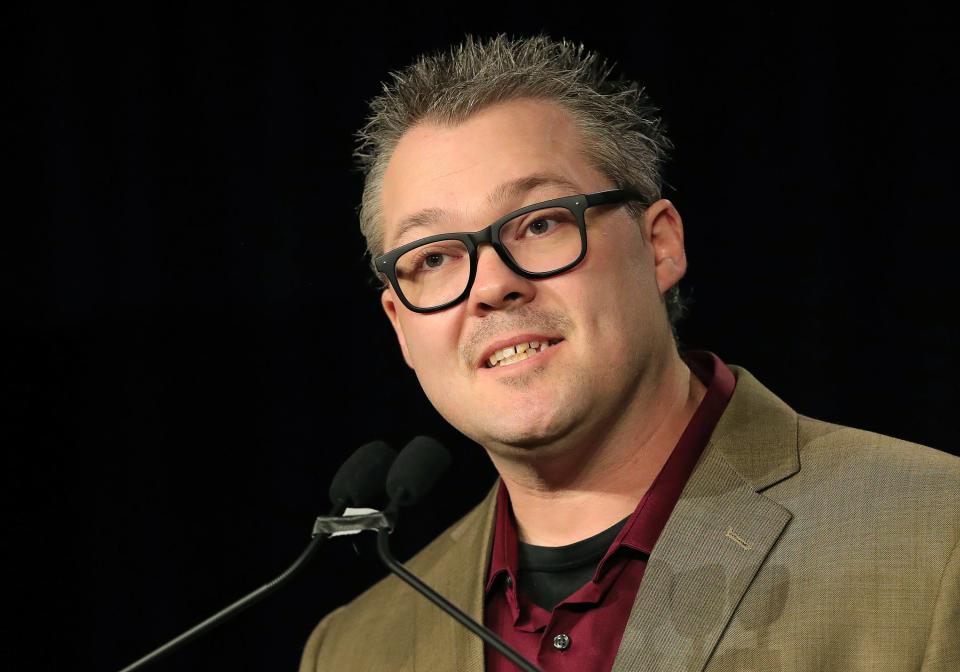
Mills: “So police reform and safety, how I would create that, so feeling safe, you have to know who the officers are who are sworn in to protect you and I, OK. I don't personally know the officers that come through my neighborhood. Their windows are usually up; they speed down my street. It's a very, a dissociation, OK. And where I come from, it may not be where you come from, but growing up, the police were suspect, meaning that I do not know if they're here for good or for ill, OK, that is a real thing. So, in order to try and break those barriers down, I would like to have actual police stop the cruiser and get out and actually knock on doors, be more involved with the community. Take steps that, so we know that they're there for us. I would like to know their names instead of having to go dig for their names or wait for a council person to uncover one at a council meeting, and then I have to go to, OK. I should be able, when I have, I'm outside with my little girl and her bike, and I see a cruiser just rolling down the street, what are they doing? I have no idea. I don't have to know their business, but I have no idea who they are. OK, that takes a first step for transparency, OK, I need to know who, like said, I keep saying who you are. I would have them more involved with the community, more community policing, OK, neighbors knowing neighbors, police officers knowing those neighbors. We can definitely start there to try and help citizens feel safer.”
Akron Citizens' Police Oversight Board: Akron's new Citizens' Police Oversight Board convenes, chooses temporary leadership
Malik: “So we have to get away from this idea that you can have safety or you can have accountable, effective policing. There’s this dichotomy that we have to be willing to look at more complexity. In 1969, there was a commission that the city of Akron put together after the 1968 riots, that if you flip to the policing section says something and I'm going to paraphrase but it says the Akron Police Department generally does a good job but has a poor relationship with our Black community. We are more than 50 years afterwards, and we have not meaningfully changed that reality. That reality is true today, because we are unwilling to have the uncomfortable conversations about making sure the community's priorities are truly reflected in our police department's priorities. So what does that mean? Well Mr. Mills is right when he talks about community policing. We have to fully implement community policing in our department. That means that we have about 450 officers, about 200-some of them are patrol officers, but we say 10 of our officers are the officers who don't have to go from call to call to call to call to call to call. What we should do is make sure that all of our patrol officers have some time and space in their week or their month to do foot patrols, to do the things that are going to allow them that space and time to build trust and respect and relationships with people. And from then, we have to go and pick up the youth violence strategic plan that has been sitting on the shelf, and we have to work with every organization in this room and across our city to fully. truly implement it so that we can get to our young people before violence ever becomes a possibility.”
Schaffer: “Well, to kind of piggyback off my last comment, I believe we need to expand police reform. I understand that there's going to be some negotiation involved in order to make that possible, and I think that expanding police reform will actually build trust with the police. I also would like to echo Tara’s idea of substations. I believe that community policing at the local level is very important, and she has a great idea there. Also, I'm the only candidate talking about decriminalizing marijuana and defunding the war on drugs, and let me tell you how that's gonna make Akron safer. OK, because right now, almost half the people in jail are there for end drug use, OK. These people who are using drugs, drug addiction is considered a mental health issue. It's a mental illness. It's a substance abuse disorder. Why are we locking up our family, our friends and our neighbors for being mentally ill? Let's defund the war on drugs from the police department and use that money for mental health care, use that money for addiction care, and we're going to stop locking up people for being mentally ill and then complaining that the jails are too full for the criminals.”
Brandyn Costa joins board: Akron City Council completes Police Oversight Board appointments with ninth confirmation
Greer: “So when we talk about police reform and making people feel safe, look, every neighborhood in Akron deserves to be safe, but before we can ever rebuild trust with the APD and all of our communities, we have to be accountable to one another. Look, in the wake of what happened to Jayland Walker when he was killed, our APD decided to remove the name tags from our officers. When you are sworn to serve and protect the citizens of Akron, but you no longer have any accountability to them because they can't even know your name or who you are, then we have lost the battle. We have to go back to building trust and relationships. Look, I want more police on the streets, on foot patrols, bike patrols right there in our neighborhoods. I actually don't want them holed up in police substations because people need to see the officers, and the officers need to learn who the people in the communities they patrol really are. And then we have to expand community policing. That's why I am calling for a citywide neighborhood ambassador program. We piloted one during my tenure as Great Streets administrator on Copley Road. We're gonna have neighborhood ambassadors, so people from the community can actually police the communities where they live and create a clean, safe and welcoming environment for all of us.”
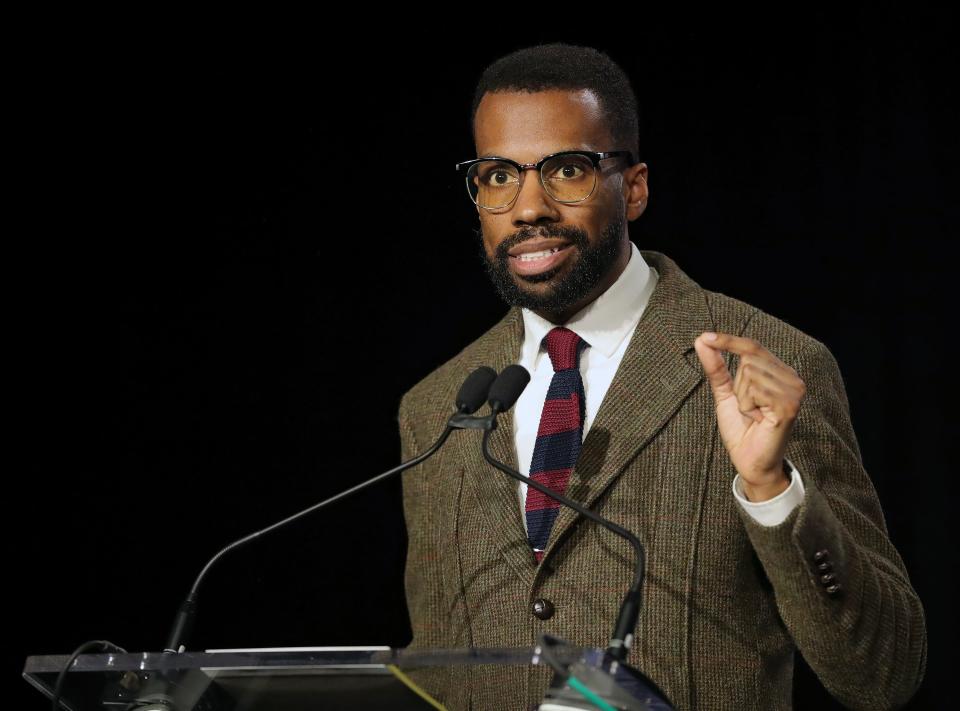
Wilhite: “As I've said in my opening remarks, safety has been a part of what I've worked on my entire public career. And a prime example of that is if we're gonna do police reform, the answers are in the community. The community can tell us how we can do a better job. And I'll give you an example of how that happened. I attended a young Black professionals meeting some couple years back and Officer Lloyd Ford, a retired police officer now, shared about how our Akron officers when they're out patrolling and there are young people in the community, they'll stop, get a pizza, sit down and just have some pizza with the young folks that are in their district just to get to know them, get to learn who they are. And what we found out after that was that those officers pay for that out of their own pocket. We thought, several of us thought that was wrong. So we went to the Akron Community Foundation, and we asked them if they would support a police and fire community engagement fund. It is there now, and it is there for officers to have the opportunity to do that. That was a public response to an issue that helps with the trust that we need to build between civilian and police officers across the city. The answers are in the community if you have a mayor who is humble enough and open enough to sit down and listen and make those things happen.”
Imokhai Okolo: Akron City Council fails to name police oversight board members by deadline. Now what?
Mosley: “As the only candidate who actually still lives in a neighborhood, grew up in a neighborhood, I know what's affecting the neighborhood because I live there. My family lives there. So when I call for substations, which Cleveland and Columbus call district stations, I know that they work because I've reached out to both of those municipalities to see how we could implement something like that here in Akron. And this is not just something I thought of because I was running for mayor. I've called for substations for over five years. This is how you rebuild trust. And Cuyahoga Falls has a vibrant neighborhood ambassador program, but that's not going to rebuild the trust that we don't have in these neighborhoods. We need our police officers out of their cars, having conversations with those people in the community, doing park and walks, getting back on their bikes, having cops on the porch. They used to do that, and then it stopped. We have to get back to the foundation of building trust in our neighborhoods if we really want to be intentional about making sure that our neighborhoods feel safe, and that they feel like they have a relationship with the police officers. So then, when we do have a shooting in a neighborhood, they don't feel as if they don't have a relationship to talk to that officer. Park and walks work. Getting out in the neighborhood, they work. When the chief first came to town, he did one with me in the center of my neighborhood, and it worked because they now know who he is. Those businesses know who he is, but we need this to happen with all of our officers across the city.”
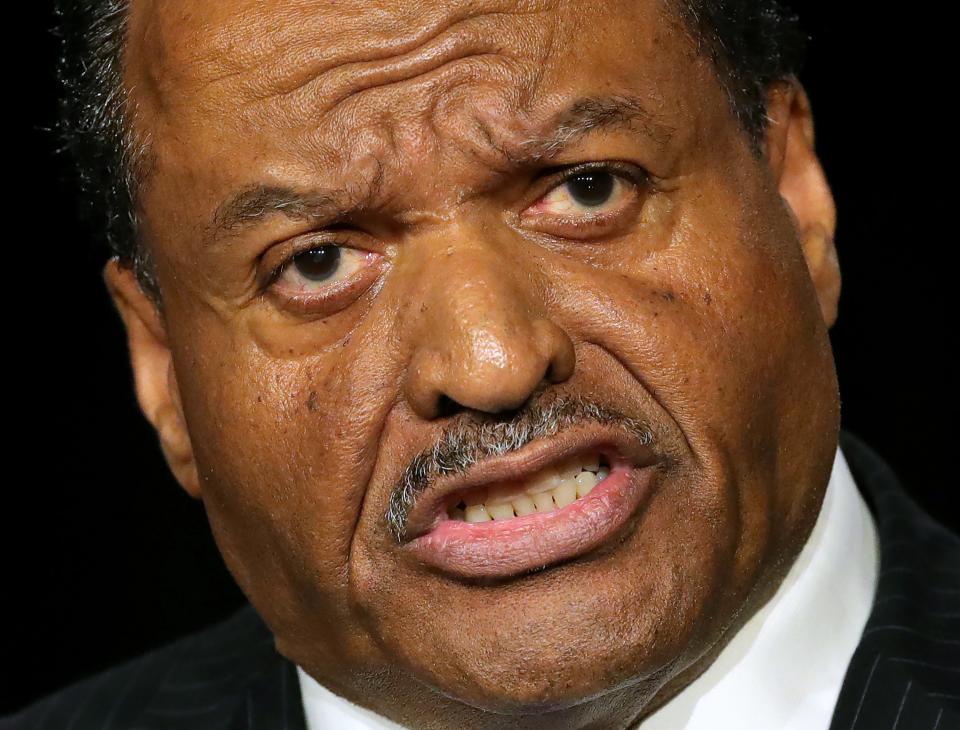
Sommerville: “Well, first of all, police reform cannot work unless the police department mirrors the community. Currently, you have 11% of the force is African American. That is way too low and is not representative of the community. And until that happens, we will not have the type of police force that we deserve. The more diverse your police department is, because some of these officers have never grew up in certain neighborhoods or inner city neighborhoods. And the fact that you would have more people of color or other experiences or other nationalities on there, they can teach and learn them how to approach people in certain communities. And when I become the mayor, I will make sure that every police officer has community service background and training in that area. I think it's also important to know that police and fire should stop when they see young kids selling pop or popcorn or in the summertime or lemonade stands as we used to call them back in the day and stop and talk to these children and develop a relationship. The other issue is that we need more women on the police department because we have found that the more women we have on the department, the better off we are because they know how to deescalate situations a lot better.”
Government transparency in Akron
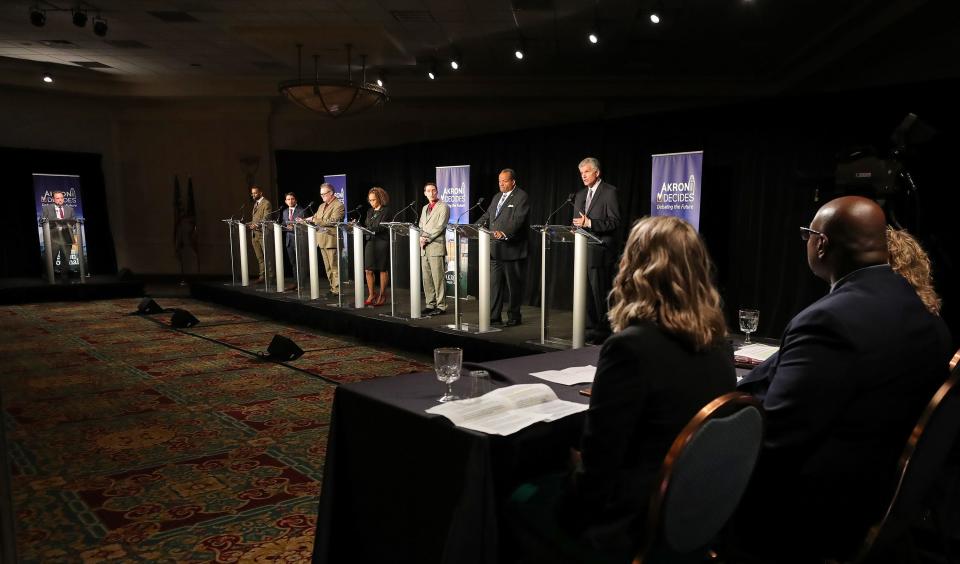
Question: Nearly half of the respondents in the recent Akron Decides poll said that the city rarely or even never listens to their voice. What would you do as mayor and what specific changes would you make to make sure that you hear and respond to residents’ concerns and also to increase the transparency of Akron city government?
Greer: “I think that's a great question, and it speaks to the real real issues and challenges we face here in Akron. I spent my time at the city as Great Streets administrator making sure that I heard the voices of our communities and our most marginalized neighborhoods because I was unwilling to think that the narrative from City Hall is the same as the narrative from the neighborhoods, and I believe that every community, every neighborhood, every family, has the right to tell their own story here in Akron, and my job is to help them tell it. When I looked at what happened in the aftermath of the killing of Jayland Walker, I think that when our City Council shut down public meetings, that was a huge mistake. We told our people that when you're hurting, and you're at your most vulnerable, we don't care to listen. In my administration and as mayor, we will ensure that not only City Hall and our council is responsible and accountable to all of our citizens, but I'm gonna propose to create in every neighborhood a community committee, made up of people that the community appoints, not people in City Hall or on council, but to ensure that our community has their authentic voice represented. We will not only listen, but we will learn from them."
Wilhite: “The first thing that I'll do is make sure that the administration and the council have a solid working relationship. It is vitally important that the mayor supports the members on council. Those ladies and gentlemen are elected to represent the folks in their ward, and if there is an issue in that particular ward, we have to work together to solve that. I would co-op departments within the city with the community, with community block club organizations, with the CDCs that are out there in our communities. Great things are happening out there. City Hall doesn't have all the answers. We collectively as a community have the answers we need to make the city strong and to give it a great future. We can't do that in silos. We are so good about looking at things and saying well that's that group or that's that group. Let's break the silos down. Let's make sure that there is across the board conversations and listen, nobody who occupies that mayor seat is going to be right all the time. We know that. Nobody has all the answers, but as a collective coming together and trying to solve issues in the community, that's the only way we move Akron forward is if it is actually truly a community spirit that moves the city forward, not a top-down approach."
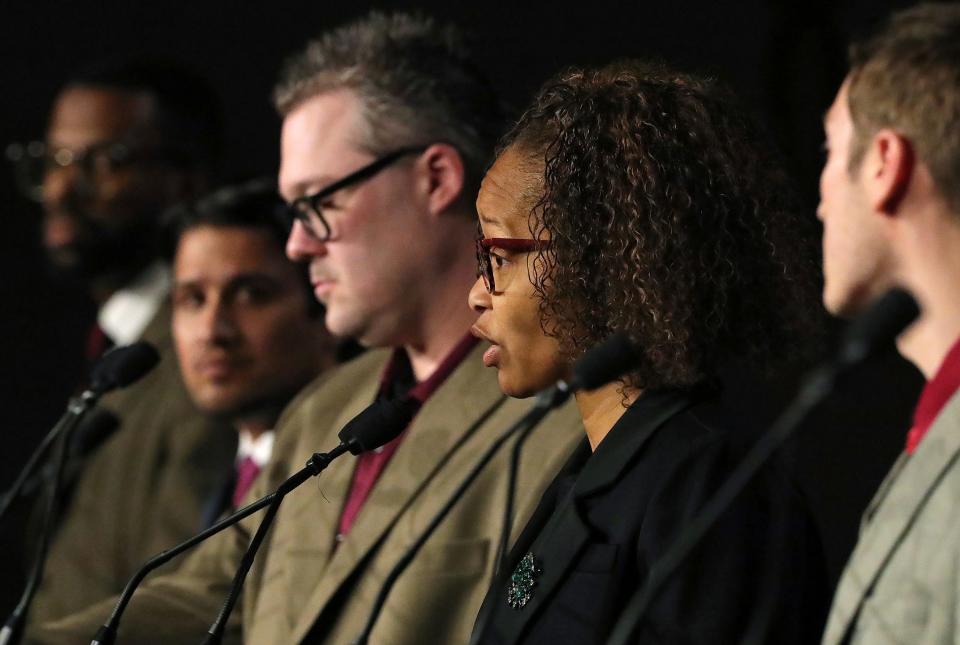
Mosley: “A mayor can listen and lead at the same time, and I think that's what hasn't happened here in the city in almost 40 years. I brought forth live-streaming legislation so that we as a government could be open and transparent with the residents who have elected us to sit in those seats. But what that has exposed to this community is how dysfunctional their local government is. I think that we have to have a City Hall that works for the residents who elected them and not work for the mayor. We are two separate branches of government, and we need to function as two separate branches of government. No mayor should always think that he has seven votes on that floor to get what he wants pushed or she gets what she wants pushed through. It has to stop. And hopefully it stops on May 2."
Sommerville: “Well, I think I'm kind of old school. I think the fact that we have block clubs and we should be tied into block clubs and talking to block clubs every month, sending them information, putting them on mailing lists and seeing what the feedback is. We also have this program now called the Zen program where we can send out a notice of what's going on in the community and get feedback either through a cellphone or a computer so we can get the pure feelings of the community. And to say that the mayor and the council should not get along I think is ludicrous. The fact that we are where we're at today is because we had a council and a mayor that worked together. I was counsel president. I did not agree with Don Plusquellic a whole lot of times. But one thing I didn't do, I always met with him, I shut the door and we resolved our differences to move the city forward. And that's why we could build all the new schools we did and all the new housing. We did all those things to make sure that it happens. I'm a funeral director, so I'm always in the community. I'm always in the grocery store. Somebody's always coming up and telling me what they feel. And that's another good way, if you're out in the neighborhood and the community, you're going to church, people will tell you are you doing a good job, and they will let you know what you need to do to make this city better. But I think we just need to continue to work together, and the city council and the mayor has to work together, and the council and the mayor should go out after meetings and have a drink of Coca-Cola."
Mills: “So listening to people, so many ideas I have. Texting services, all-calls, incentivize citizens to participate, provide a budget for city councilmen and women. As a mayor, I will go anywhere with anyone who needs me to. I will be an open mayor. There'll be no, I am not the king of Akron when elected. It just makes no sense. I am one of you. I serve you. You are paying me, OK. It is a customer service mindset. It has to be just ingrained in any public servant. I will make sure I manage social media and expand it. Make sure that when you call 311, somebody actually answers not a I might answer, I'll get back to you, making sure there's someone to assist. That's under the job, by the way, OK, someone we could pay that stays in Akron. I personally would walk the neighborhoods whenever possible. Walking's good for you, OK, especially for someone who clocks in at about 240, OK, so I think I can get down to about 220. Make sure I show up at churches, schools cooperate with APS, make sure we have digital creators on staff for your TikToks, your Instagram, your Facebook reels, your YouTube, that's where people are, they're hanging out, you're always staring at your phone. Always strive to have that customer service mindset. My phone number is on my literature, and it'll still be there. You can actually call the mayor. How cool is that? Partner with our libraries, make sure information is readily available, make sure the website is actually user-friendly, and have events posted before they happen, OK. Partner with our local businesses to make sure hey, this is happening, join us as a city government."
Malik: “Folks, this is the biggest reason I decided to run for mayor. Over my time on council, I've watched over and over and over again, across different issues, of folks feeling they were not heard. People might listen. There's a difference between listening and being heard. For decades, we have seen our population decline. We have a top-down city government, and we don't have a shared vision as a community of where we are going. The most important thing is that we build a city government that is more open, more responsive and more collaborative, where we not only listen, but we hear and we act as a response. I am a leader who has a track record of doing that. We as a city got $145 million in taxpayer money from the federal government, and the priorities for that money were decided by one person. City Council voted to delegate our authority. And you've seen recently in the Beacon Journal how we've delegated our authority on a whole lot of other things as well. We have to have a situation where Keith is right: the mayor can no longer be king, but we need a mayor who wants to build a shared vision, a consensus-built model of governing. That's what we've done with our Together for Akron plan. We will make sure we continue with those priorities on year one, year four and beyond. And we will act, and we will do it together."
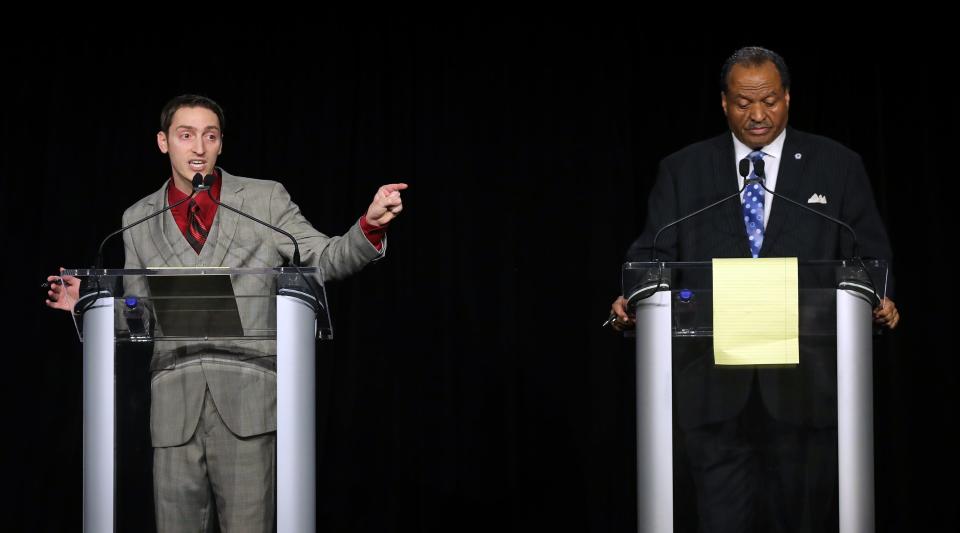
Schaffer: “Marco, I prefer Pepsi but the first round of Coke's on me. So what would I do to help residents and hear their concerns? The community cannot access the mayor until the mayor accesses the community. I'm the only one here talking about being a modest mayor, about working hourly jobs, whether it's mowing the lawn at the parks or taking the trash out with the sanitation department, working with the fire department. I'm the only one talking about taking the bus to work so I can meet people where I'm at, so I can be accountable to the average, everyday person. I'm the only one talking about an open office policy, where my door will be open and we will have meetings directly one-on-one once a week with citizens. And finally, more transparency with public records requests. Look the city over and over and over again is denying public records requests to myself, to the Beacon Journal, who is suing them. We need to be more open and we need to be more transparent and we need to release more public records.
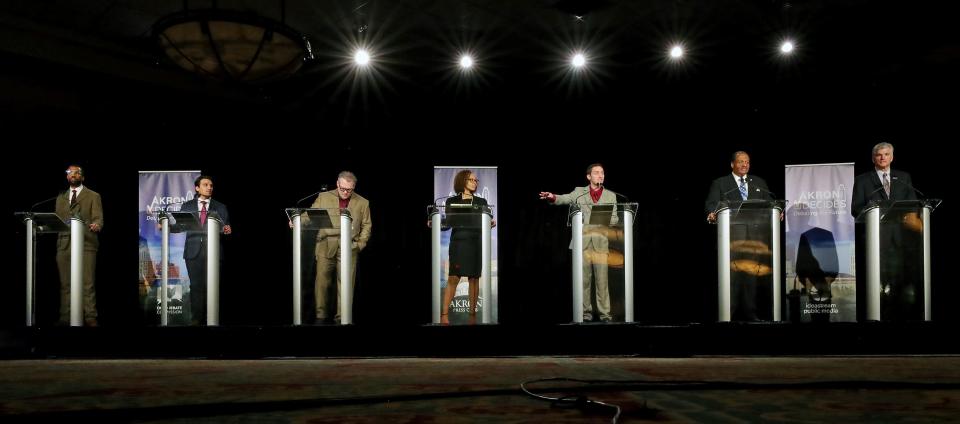
Second Akron mayor debate next week
A replay of the debate is available on this page. The debate also will air on Ideastream's WKSU at 9 p.m. Wednesday.
The debate at Quaker Station was moderated by Beacon Journal Editor Michael Shearer, with a media panel of Anna Huntsman, Ideastream Public Media reporter/producer; Cheryl Powell, Beacon Journal managing editor; and Mark Turner, Ohio University assistant professor of journalism.
A 7 p.m. April 12 debate will be held at the Akron-Summit County Public Library on High Street. It is free and open to the public with advance tickets available through the Ohio Debate Commission web site.
Both BeaconJournal.com and Ideastream.org also will stream this debate, with replays available. It will air at 9 p.m. that night on WKSU and on WVIZ (PBS) television at 7:30 p.m. April 13.
Candidates will answer questions submitted in advance from the public. The event will be moderated by Rick Jackson, Ideastream senior host/producer, and Andrew Meyer, Ideastream Public Media deputy editor/news.
The Akron Press Club, Ideastream Public Media, Akron Beacon Journal/BeaconJournal.com and the Ohio Debate Commission are collaborating for both debates.

Primary election is May 2
The primary election in which voters will decide on the next Akron mayor is May 2, with polls open from 6:30 a.m. to 7:30 p.m. Early voting is already underway.
Summit County primary election: Why did my Summit County polling place change? Everything to know about May 2 election
The seven candidates that participated in Wednesday's debate are all Democrats. There is no Republican on the ballot for mayor of Akron this year after the Summit County Board of Elections, comprised of two Democrats and two Republicans, voted unanimously to reject the certification of Republican Jim Isabella's petition to run for mayor.
Isabella, a former conservative talk radio host on WNIR, was the only Republican to make the Feb. 1 filing deadline. Though he turned in more than 70 signatures, only 43 were found to belong to registered voters in Akron. Fifty signatures are needed to run for mayor in Akron.
If a Republican does try to run, they would have to file as an independent or write-in candidate. The filing deadline for independent candidates is May 1.
No Republican Akron mayor candidates: Election board rejects only Republican running for Akron mayor, 2 Democrats for council
This article originally appeared on Akron Beacon Journal: Akron mayoral candidates discuss police reform, school safety at debate

